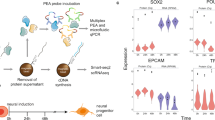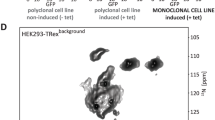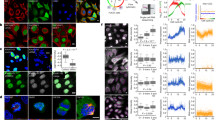Abstract
It is widely accepted that numerous genes are expressed in a cell-cycle dependent manner, with cycle-specific variations in mRNA content or peaks of protein content during the cell cycle. These proposed variations raise the problem of how varying cell cycle gene expression is regulated. This is the "infinite regression" problem or Russian Doll problem where postulating a cell-cycle specific control element merely pushes the explanation of cell-cycle variation back one step to the problem of how that control element itself appears and disappears at particular times during the cell cycle. We present evidence that cyclin mRNA content is invariant during the cell cycle and calculations reveal that mRNA variation does not account for observed protein variations during the cell cycle. The experimental evidence for protein breakdown only at the end of the cell cycle leads to a general model for cell-cycle control that avoids the Russian Doll problem.
Similar content being viewed by others
Article PDF
Author information
Authors and Affiliations
Rights and permissions
About this article
Cite this article
Cooper, S., Shedden, K. & Vu-Phan, D. Invariant mRNA content and mitotic protein breakdown as a solution to the Russian Doll problem of the mammalian cell cycle. Nat Prec (2007). https://doi.org/10.1038/npre.2007.1218.1
Received:
Accepted:
Published:
DOI: https://doi.org/10.1038/npre.2007.1218.1



